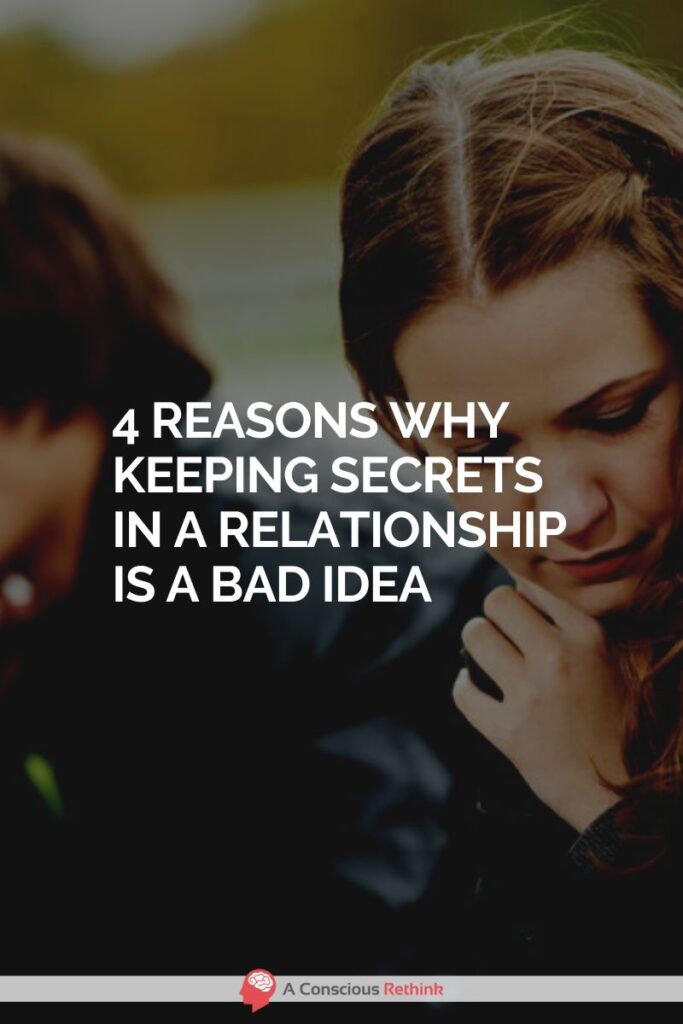
Are you struggling with the age-old question of whether it’s acceptable to keep secrets from your partner? We all know that open communication is important in a relationship, but sometimes the idea of revealing every little detail can be daunting. In this article, we will explore the concept of secrecy in relationships, examining the potential reasons behind keeping secrets and the potential impact it can have on your partnership. So, let’s dive into the fascinating world of relationship secrets and unravel the complexities that lie within.
The Importance of Trust in a Relationship
Trust is the pillar upon which a strong and healthy relationship is built. It is the foundation that holds everything together and allows both partners to feel safe, secure, and valued. Without trust, a relationship can quickly crumble, leading to misunderstandings, conflicts, and emotional distance. That is why it is crucial to prioritize trust and work towards fostering it in every aspect of your relationship.
Building a Strong Foundation
Trust begins to develop from the very moment a relationship starts. It requires honesty, transparency, and consistency in our words and actions. Building a strong foundation of trust involves being reliable and accountable, keeping your promises, and being there for your partner in times of need. By demonstrating trustworthiness, you establish a solid base upon which your relationship can grow and thrive.
Creating Emotional Intimacy
Emotional intimacy is the ability to be vulnerable and open with your partner, sharing your deepest thoughts, fears, and dreams. Trust plays a fundamental role in creating this level of emotional connection. When you trust your partner, you feel safe opening up and expressing your true self without fear of judgment or rejection. This emotional intimacy not only strengthens the bond between you two but also promotes a sense of acceptance and understanding.
Fostering Open Communication
Open communication is an essential component of trust in a relationship. It involves actively listening to your partner, expressing your thoughts and feelings honestly, and being receptive to their perspectives. When you communicate openly, you build trust by showing that you value your partner’s input and are committed to working through challenges together. Honesty in communication establishes a safe space for both partners to share their thoughts and concerns without fear of negative consequences.
Promoting Mutual Respect
Mutual respect is integral to building and maintaining trust. It means recognizing and honoring each other’s boundaries, values, and needs. Respecting your partner’s opinions, choices, and autonomy fosters a sense of trust as it demonstrates that you value and trust their judgment. When both partners treat each other with respect, trust flourishes, and the relationship grows stronger.
Differentiating Between Harmless Secrets and Deception
While trust is crucial for a healthy relationship, it is essential to recognize that not every secret is a sign of deception or lack of trust. Understanding the intentions behind secrets and evaluating their potential impact on the relationship is necessary to differentiate between harmless secrets and harmful deception.
Understanding the Intentions Behind Secrets
Not all secrets are harmful or rooted in deception. Sometimes, we keep secrets to protect ourselves or our partners from unnecessary worry or anxiety. For example, if you are planning a surprise birthday party for your partner, keeping it a secret adds a sense of excitement and joy to the surprise. Intentions behind secrets can be positive, focused on maintaining a sense of excitement or preserving personal privacy.
Evaluating the Potential Impact on the Relationship
When deciding whether a secret should be revealed or kept, it’s essential to consider the potential impact on the relationship. Harmless secrets that have no direct impact on the emotional or physical well-being of your partner may be more acceptable. However, if a secret has the potential to harm or significantly impact the relationship, it is crucial to reevaluate the decision to keep it hidden.

This image is property of i.ytimg.com.
Identifying Healthy Reasons for Keeping Secrets
While open communication is vital, there are instances when keeping a secret can be a healthy choice within a relationship. It is essential to identify the situations in which keeping a secret is justified to ensure that both partners’ wellbeing and privacy are respected.
Preserving Personal Privacy and Autonomy
As individuals, we all have the right to maintain a certain level of privacy and autonomy. There may be aspects of our lives that we prefer to keep private, such as personal thoughts or experiences. Respecting each other’s need for personal privacy allows for a healthy balance in the relationship while still maintaining trust.
Protecting the Partner’s Feelings
Sometimes, keeping a secret can be a compassionate decision aimed at protecting your partner’s feelings. For example, if your partner is feeling self-conscious about their new haircut, but you genuinely love it, keeping that positive opinion to yourself can prevent unnecessary insecurities. In such cases, withholding certain information can be an act of empathy and kindness.
Maintaining Confidence in Professional Matters
In certain professional contexts, keeping secrets or confidential information is necessary. If you or your partner is entrusted with sensitive business matters or client confidentiality, it is essential to honor those commitments. Maintaining confidence in professional matters demonstrates reliability and integrity, contributing to the overall trust within the relationship.
Examining the Consequences of Keeping Secrets
While some secrets may be justifiable, it is crucial to understand the potential consequences of keeping secrets within a relationship. Keeping secrets can erode trust, create communication barriers, increase emotional distance, and ultimately undermine the foundation of the relationship.
Eroding Trust and Causing Distrust
When one partner discovers that the other has been keeping significant secrets, it often leads to a breakdown of trust. Trust is based on mutual openness, honesty, and the belief that both partners are working towards the best interests of the relationship. Secret-keeping can shatter that trust and create doubt and suspicion between partners.
Creating Communication Barriers
Keeping secrets can hinder open and honest communication between partners. When one person is withholding information, it becomes challenging to have meaningful discussions and make informed decisions together. Secrets breed a lack of transparency and inhibit the flow of communication within the relationship.
Increasing Emotional Distance
Secrets have the power to drive a wedge between partners, creating emotional distance and isolation. When one partner feels the need to hide information or keep secrets, it undermines the emotional connection and intimacy that is necessary for a healthy relationship. Emotional distance can lead to feelings of loneliness and detachment, ultimately straining the relationship.
Undermining the Foundation of the Relationship
Trust is the foundation on which a relationship is built. Keeping secrets erodes that foundation, leading to cracks in the relationship’s stability. When trust is undermined, it becomes challenging to rebuild the closeness and security that healthy relationships thrive on.

This image is property of cdn.punchng.com.
Navigating Sensitive Topics
Addressing sensitive topics within a relationship requires tact, empathy, and a commitment to open and respectful communication. By employing effective communication strategies, seeking professional help when necessary, and establishing boundaries, couples can navigate sensitive topics successfully.
Effective Communication Strategies
When discussing sensitive topics, it is crucial to approach the conversation with empathy and openness. Focus on active listening, demonstrating that you genuinely hear and understand your partner’s perspective. Use “I” statements to express your feelings without attacking or blaming your partner. Finding a comfortable and neutral environment to discuss sensitive topics can also contribute to a more productive conversation.
Seeking Professional Help When Necessary
Sometimes, sensitive topics may require the assistance of a trained professional, such as a couples’ therapist or counselor. Seeking professional help can provide a safe space for both partners to express themselves and work through complex emotions. Therapists can guide couples in establishing healthier communication patterns and offer tools to navigate sensitive topics effectively.
Establishing Boundaries and Respecting Limits
Setting boundaries is crucial when discussing sensitive topics. It involves recognizing each partner’s limits and ensuring that discussions remain respectful and constructive. Establishing boundaries allows both partners to communicate their needs and expectations and creates a sense of safety within the relationship.
The Role of Honesty in Promoting Emotional Intimacy
Honesty is a powerful tool in fostering emotional intimacy within a relationship. It involves sharing vulnerabilities, past experiences, and even difficult truths. By embracing honesty, partners can build a stronger emotional connection and trust.
Sharing Vulnerabilities and Past Experiences
Honesty involves being transparent about your vulnerabilities and past experiences that have shaped who you are. By sharing these intimate details with your partner, you create a space for understanding, empathy, and compassion. Sharing vulnerabilities fosters emotional intimacy and allows for a deeper level of connection between partners.
Building a Deeper Emotional Connection
Honesty enables partners to build a deeper emotional connection by sharing their true selves without fear of judgment or rejection. Authenticity promotes trust and intimacy, as both partners feel seen, heard, and accepted for who they are. This deeper emotional connection enhances the overall quality of the relationship.
Developing Trust and Intimacy
When partners are honest with each other, trust naturally develops. Honest communication forms the basis for the mutual understanding and respect needed for a healthy relationship. By being transparent and truthful, partners establish a sense of safety and security, which promotes emotional intimacy.

This image is property of cdn.powerofpositivity.com.
When Secrets Can Be Damaging
While some secrets may be harmless or justified, others can have severe consequences for the relationship. It is essential to recognize situations where keeping secrets can be damaging and detrimental to the overall well-being of both partners.
Lies and Deception
Keeping secrets that involve lies and deception can have severe consequences for a relationship. When one partner intentionally withholds information or misleads the other, it fractures trust and undermines the foundation of the relationship. Lies and deception erode the integrity of the relationship and can lead to significant emotional pain and conflict.
Infidelity and Cheating
One of the most damaging secrets in a relationship is infidelity or cheating. Extramarital affairs not only breach trust but also introduce feelings of betrayal and heartbreak. The discovery of infidelity can have long-lasting emotional consequences and often requires significant effort to rebuild trust and heal the relationship.
Financial Secrets or Irresponsible Behavior
Money is a common source of tension within relationships. Keeping financial secrets, such as hidden debts, irresponsible spending, or undisclosed financial assets, can lead to significant problems. Financial secrets erode trust and can have severe consequences for the stability and security of the relationship.
Health-Related Issues and Risks
Keeping health-related secrets can have serious implications for both partners’ well-being. Failing to disclose important medical conditions, sexually transmitted infections, or substance abuse problems can put the health and safety of both partners at risk. Open and honest communication about health-related matters is crucial for maintaining trust and ensuring the overall health of the relationship.
Rebuilding Trust After a Betrayal
After a significant betrayal, such as infidelity or deception, rebuilding trust can be a challenging process. However, with commitment and effort from both partners, trust can be rebuilt and the relationship can become stronger than before.
Acknowledging and Taking Responsibility for Actions
The first step in rebuilding trust is acknowledging and taking responsibility for the actions that led to the betrayal. The offending partner must show genuine remorse and express a willingness to change their behavior. Taking responsibility demonstrates a commitment to repairing the damage caused and rebuilding trust.
Transparent Communication
Rebuilding trust requires open and transparent communication. The partner who broke trust must be willing to answer any questions and provide reassurance to their partner. Transparent communication helps rebuild trust by demonstrating a sincere commitment to honesty and openness.
Seeking Professional Guidance
In some cases, rebuilding trust after a betrayal may require the assistance of a trained professional. Couples’ therapy or counseling can provide a safe and supportive environment for both partners to work through their emotions and develop strategies to rebuild trust. A therapist can guide the process, provide tools, and help both partners address any underlying issues that may have contributed to the betrayal.
Rebuilding Emotional and Physical Intimacy
Rebuilding trust often involves rebuilding emotional and physical intimacy within the relationship. This process requires patience, understanding, and a commitment to being vulnerable with one another. By intentionally working on emotional and physical intimacy, partners can build a stronger and more resilient relationship.

This image is property of www.aconsciousrethink.com.
Mutual Agreement on Privacy and Boundaries
Establishing clear expectations and mutual agreement on privacy and boundaries is essential for maintaining trust in a relationship. Each partner should feel comfortable expressing their boundaries and privacy needs, and both should strive to respect and honor those limits.
Establishing Clear Expectations
Open and honest communication about privacy expectations is crucial. Discussing topics such as sharing passwords, maintaining separate social lives, or discussing personal matters with friends and family can help establish clear expectations and avoid potential conflicts. Understanding each other’s needs establishes a foundation for trust and respect.
Respecting and Honoring Individual Privacy
Respecting and honoring individual privacy is important for maintaining a healthy balance in a relationship. Each partner should have the freedom to maintain aspects of their life that are private and personal, without feeling controlled or invaded. Respecting individual privacy demonstrates trust and reinforces the understanding that partners are individuals with their own autonomy.
Determining Acceptable Levels of Secrecy
Determining acceptable levels of secrecy within a relationship can help maintain trust and avoid unnecessary conflicts. While complete transparency may not be feasible or necessary in all areas, partners should strive to communicate openly about those aspects of their life that directly impact the relationship and the well-being of both partners. Establishing boundaries around secrecy ensures that trust is maintained while honoring individual autonomy.
The Role of Individual Judgment and Context
When it comes to secrets and trust within a relationship, individual judgment and context play a significant role. Each relationship is unique, and what may work for one couple may not work for another. It is important to assess the dynamics of your relationship, consider cultural and personal beliefs, and weigh the potential benefits and consequences of keeping secrets.
Assessing the Unique Dynamics of the Relationship
Some relationships may naturally have a higher tolerance for privacy and secrecy, while others require a higher level of openness and transparency. Assessing the unique dynamics of your relationship helps determine what is acceptable and appropriate for both partners. Open and honest conversations about secrets and trust can help find a balance that works for your specific relationship.
Considering Cultural and Personal Beliefs
Cultural and personal beliefs can heavily influence attitudes towards secrecy and trust. Some cultures prioritize individual privacy, while others emphasize communal values and transparency. Understanding and respecting each other’s cultural and personal beliefs is essential in finding a common ground that respects both partners’ needs.
Weighing the Potential Benefits and Consequences
Lastly, it is important to carefully weigh the potential benefits and consequences of keeping a secret within the context of your specific relationship. Consider how the secret may impact trust, emotional intimacy, and the overall health of the relationship. By honestly evaluating the potential outcomes, you can make informed decisions about what is best for your partnership.
In conclusion, trust is the bedrock of a healthy and fulfilling relationship. Building and maintaining trust requires open communication, honesty, and a commitment to the emotional wellbeing of both partners. While there may be instances where keeping secrets is justifiable, it is crucial to recognize the potential consequences and assess the impact on trust and the relationship. By navigating sensitive topics with empathy, seeking professional help when needed, and establishing clear boundaries, partners can foster trust, strengthen their emotional connection, and ensure a long-lasting and fulfilling relationship.






